- Home
- Ellen Datlow
The Best of the Best Horror of the Year Page 10
The Best of the Best Horror of the Year Read online
Page 10
He can remember the time that his first tooth came out, and he put it under his pillow in a tiny bag that his mother had made for him which said “Tooth Fairy,” but then the teeth began to come out very quickly after that and the sharp ones came in. Not like Mother or Father’s teeth. And the fingernails began to thicken, and the hairs on his forearms and chin and back, and his eyes changed color.
“Tell me,” says Mr. Breeze. “You didn’t hurt your parents, did you? You loved them, right? Your mom and dad?”
After that, they are quiet again. They are driving and driving and the darkness of the mountain roads closes in around them. The shadows of pine trees, fussing with their raiments. The grim shadows of solid, staring boulders. The shadows of clouds lapping across the moon.
You loved them, right?
Peter leans his head against the passenger window and closes his eyes for a moment, listening to the radio as Mr. Breeze moves the knob slowly across the dial: Static. Static—static—man crying—static—static—very distant Mexican music fading in and out—static—man preaching fervidly—static—static. And then silence as Mr. Breeze turns it off, and Peter keeps his eyes closed, tries to breathe slow and heavy like a sleeping person does.
You loved them, right?
And Mr. Breeze is whispering under his breath. A long stream of whisps, nothing recognizable.
When Peter wakes, it’s almost daylight. They are parked at a rest stop—Peter can see the sign that says “WAGONHOUND REST AREA” sitting in a pile of white rocks, he can see the outlines of the little buildings, one for MEN, one for WOMEN, and there is some graffiti painted against the brick, FOR GOD SO LOVED THE WOLRD HE GAVE HIS ONLY BEGONTEN SON, and the garbage cans tipped over and strewn about, the many fast food bags ripped open and torn apart and licked clean, and then the remnants licked again later, hopefully, and the openings of the crushed soda cans tasted, hopefully, and the other detritus examined, sniffed though, scattered.
There is a sound nearby. Sounds. A few of them creeping closer.
An old plastic container is being nosed along the asphalt, prodded for whatever dried bit of sugar might still adhere to the interior. Peter hears it. It rolls—thok thok thok—then stops. One has picked it up, one is eying it, the hardened bit of cola at the bottom. He hears the crunch of teeth against the plastic bottle, and then the sound of loud licking and mastication.
And then one is coming near to the car, where he and Mr. Breeze are supposed to be sleeping.
One leaps up onto the front of the Cadillac, naked, on all fours, and lets out a long stream of pee onto the hood of the car. The car bounces as the boy lands on it, and there is the thick splattering sound, and then the culprit bounds away.
That shakes Mr. Breeze awake! He jerks up, scrabbling, and briefly Peter can see Mr. Breeze’s real face, hard-eyed and teeth-bared—nothing kindly, nothing from television, nothing like a friendly puppet—and Mr. Breeze clutches his gun and swings it in a circle around the car.
“What the fuck!” Mr. Breeze says.
For a minute, he breathes like an animal, in tight, short gasps. He points his gun at the windows: Front. Back. Both sides. Peter makes himself small in the passenger seat.
Afterward, Mr. Breeze is unnerved. They start driving again right away, but Mr. Breeze doesn’t put his gun in the glovebox. He keeps it in his lap and pats it from time to time, like it is a baby he wants to stay asleep.
It takes him a while to compose himself.
“Well!” he says, at last, and he gives Peter his thin lipped smile. “That was a bad idea, wasn’t it?”
“I suppose so,” Peter says. He watches as Mr. Breeze gives the gun a slow, comforting stroke. Shhhhhhh. There, there. Mr. Breeze’s friendly face is back on now, but Peter can see how the fingertips are trembling.
“You should have said something to me, Peter,” Mr. Breeze says, in a kindly but reproachful voice.
Mr. Breeze raises an eyebrow.
He frowns with mild disappointment.
“You were asleep,” Peter says, and clears his throat. “I didn’t want to wake you up.”
“That was very thoughtful of you,” Mr. Breeze says, and Peter glances down at his map. He looks at the dots: Wamsutter. Bitter Creek. Rock Springs. Little America. Evanston.
“How many of them were there, do you think, Peter?” Mr. Breeze says. “A dozen?”
Peter shrugs.
“A dozen means twelve,” Mr. Breeze says.
“I know.”
“So—do you think there were twelve of them? Or more than twelve of them?”
“I don’t know,” Peter says. “More than twelve?”
“I should say so,” Mr. Breeze says. “I would venture to guess that there were about fifteen of them, Peter.” And he is quiet for a little while, as if thinking about the numbers, and Peter thinks about them too. When he thinks about one dozen, he can picture a container of eggs. When he thinks about fifteen, he can picture a 1 and a 5 standing together, side by side, holding hands like brother and sister.
“You’re not like them, Peter,” Mr. Breeze whispers. “I know you know that. You’re not one of them. Are you?”
What is there to say?
Peter stares down at his hands, at his sore, shaved fingernails; he runs his tongue along the points of his teeth; he feels the hard, broad muscles of his shoulders flex, the bristled hairs on his back rubbing uncomfortably against his T-shirt.
“Listen to me,” says Mr. Breeze, his voice soft and stern and deliberate. “Listen to me, Peter. You are a special boy. People like me travel all over the country, looking for children just like you. You’re different, you know you are. Those things back there at the rest stop? You’re not like them, you know that, don’t you?”
After a time, Peter nods.
You loved them, right? Peter thinks, and he can feel his throat tighten.
He hadn’t meant to kill them. Not really.
Most of the time, he forgets that it happened, and even when he does remember he can’t recall why it happened.
It was as if his mind was asleep for a while, and then when he woke up there was the disordered house, as if a burglar had turned over every object, looking for treasure. His father’s body was in the kitchen, and his mother’s was in the bedroom. A lot of blood, a lot of scratches and bites on her, and he put his nose against her hair and smelled it. He lifted her limp hand and pressed the palm of it against his cheek and made it pet him. Then he made it hit him in the nose and the mouth.
“Bad,” he had whispered. “Bad! Bad!”
“It’s going to be better once we get to Salt Lake,” Mr. Breeze says. “It’s a special school for children like you, and I know you’re going to enjoy it so much. You’re going to make a lot of new friends! And you’re going to learn so much, too, about the world! You’ll read books and work with a calculator and a computer, and you’ll do some things with art and music! And there will be counselors there who will help you with your … feelings. Because the feelings are just feelings. They are like weather, they come and go. They’re not you, Peter. Do you understand what I’m saying?”
“Yes,” Peter says. He stares out to where the towering white-yellow butte cliffs have been cut through to make room for the road, and the metal guard rail unreels beside them, and the sky is a glowing, empty blue. He blinks slowly.
If he goes to this school, will they make him tell about his mom and dad?
Maybe it will be all right, maybe he will like it there.
Maybe the other children will be mean to him, and the teachers won’t like him either.
Maybe he is special.
Will his fingernails always hurt like this? Will they always have to be cut and filed?
“Listen,” Mr. Breeze says. “We’re coming up on a tunnel. It’s called the Green River Tunnel. You can probably see it on your map. But I want to tell you that there have been some problems with these tunnels. It’s easy to block the tunnels from either end, once a car is inside it, so I�
��m going to speed up, and I’m going to go very, very fast when we get there. Okay? I just want you to be prepared. I don’t want you to get alarmed. Okay?”
“Okay,” Peter says, and Mr. Breeze smiles broadly and nods and then without another word they begin to accelerate. The guard rail begins to slip by faster and faster until it is nothing but a silver river of blur, and then the mouths of the tunnels appear before them—one for the left side of the road, one for the right, maybe not mouths but instead a pair of eyes, two black sockets beneath a ridged hill, and Peter can’t help himself, he tightens his fingers against his legs even though it hurts.
When they pass beneath the concrete arches, there is a soft whuff sound as if they’ve gone through the membrane of something, and then suddenly there is darkness. He can sense the curved roof of the tunnel over them, a rib cage of dark against dark flicking overhead, and the echo of the car as it speeds up, faster and faster, a long crescendo as the opening in the distance grows wider and wider, and the opening behind them grows smaller.
But even as the car quickens, Peter can feel time slowing down, so that each rotation of tire is like the click of the second hand of a clock. There are kids in the tunnel. Twenty? No, thirty maybe, he can sense the warm bodies of them as they flinch and scrabble up the walls of the tunnel, as they turn and begin to chase after the car’s taillights, as they drop stones and bits of metal down from their perches somewhere in the tunnel’s concrete rafters. “Yaaah!” they call. “Yaaah!” And their voices make Peter’s fingers ache.
In front of them, the hole of daylight spreads open brighter, a corona of whiteness, and Peter can only see the blurry shadow-skeletons of the kids as they leap in front of the car.
They must be going a hundred miles an hour or more when they hit the boy. The boy may be eight or nine, Peter can’t tell. There is only the imprint of a contorted face, and the cry he lets out, a thin, wiry body leaping. Then, a heavy thump as the bumper connects with him, and a burst of blood blinds the windshield, and they hear the clunking tumble of the body across the roof of the car and onto the pavement behind them.
Mr. Breeze turns on the windshield wipers, and cleaning fluid squirts up as the wipers squeak across the glass. The world appears through the smeared arcs the wipers make. There is a great expanse of valley and hills and wide open sky.
“We’re getting very low on gas,” Mr. Breeze says, after they’ve driven for a while in silence.
And Peter doesn’t say anything.
“There’s a place up ahead. It used to be safe, but I’m not sure if it’s safe anymore.”
“Oh,” Peter says.
“You’ll tell me if it’s safe, won’t you?”
“Yes,” Peter says.
“It’s called Little America. Do you know why?”
Mr. Breeze looks at him. His eyes are softly sad, and he smiles just a little, wanly, and it’s tragic, but it’s also okay because that boy wasn’t special, not like Peter is special. It is something to be left behind us, says Mr. Breeze’s expression.
Peter shrugs.
“It’s very interesting,” Mr. Breeze says. “Because there once was an explorer named Richard Byrd. And he went into Antarctica, which is a frozen country far to the south, and he made a base on the Ross Ice Shelf, south of the Bay of Whales. And he named his base ‘Little America.’ And so then later—much much later—they made a motel in Wyoming, and because it was so isolated they decided to call it by the same name. And they used a penguin as their mascot, because penguins are from Antarctica, and when I was a kid there were a lot of signs and billboards that made the place famous.”
“Oh,” Peter says, and he can’t help but think of the kid. The kid saying, “Yaaah!”
They are driving along very slowly, because it is still hard to see out of the windshield, and the windshield wiper fluid has stopped working. It makes its mechanical sound, but no liquid comes out anymore.
It is a kind of oasis, this place. This Little America. A great, huge parking lot, and many gas pumps, and a store and beyond that a motel, with a green concrete dinosaur standing in the grass, a baby brontosaurus, a little taller than a man.
It is the kind of landscape they like. The long, wide strip-mall buildings with their corridors of shelves; the cave-like concrete passageways of enormous interstate motels, with their damp carpets and moldering beds, the little alcoves where ice machines and tall soda vendors may still be inexplicably running; the parking lots where the abandoned cars provide shelter and hiding places, better than a forest of trees.
“There are a lot of them around here, I think,” Mr. Breeze says, as they settle in next to a pump. Above them, there is a kind of plastic-metal canopy, and they sit for a while under its shade. Peter can sense that Mr. Breeze is uncertain.
“How many of them are there, do you think?” Mr. Breeze says, very casually, and Peter closes his eyes.
“More than a hundred?” Mr. Breeze says.
“Yes,” Peter says, and he looks at Mr. Breeze’s face, surreptitiously, and it is the face of a man who has to jump a long distance, but does not want to.
“Yes,” he says. “More than a hundred.”
He can feel them. They are peering out from the travel center building and the windows of the boarded-up motel and old abandoned cars in the parking lot.
“If I get out of the car and try to pump gas, will they come?” Mr. Breeze says.
“Yes,” Peter says. “They will come very fast.”
“Okay,” Mr. Breeze says. And the two of them are silent for a long time. The face of Mr. Breeze is not the face of a television man, or a skeleton, or a puppet. It is the elusive face that adults give you when they are telling you a lie, for your own good, they think, when there is a big secret that they are sorry about.
Always remember, Peter’s mother said. I loved you, even …
“I want you to hold my gun,” Mr. Breeze says. “Do you think you can do that? If they start coming … ?”
And Peter tries to look at his real face. Could it be said that Mr. Breeze loved him, even if …
“We won’t make it to Salt Lake unless we get gas,” Mr. Breeze says, and Peter watches as he opens the door of the car.
Wait, Peter thinks.
Peter had meant to ask Mr. Breeze about his son, about Jim, the rock hound. “You killed him, didn’t you?” Peter had wanted to ask, and he expected that Mr. Breeze would have said yes.
Mr. Breeze would have hesitated for a while, but then finally he would have told the truth, because Mr. Breeze was that kind of person.
And what about me? Peter wanted to ask. Would you kill me too?
And Mr. Breeze would have said yes. Yes, of course. If I needed to. But you would never put me in that situation, would you, Peter? You aren’t like the others, are you?
Peter thinks of all this as Mr. Breeze steps out of the car. He can sense the other kids growing alert, with their long black nails and sharp teeth, with their swift, jumping muscles and bristling hairs. He can see the soft, slow movement of Mr. Breeze’s legs. How easy it would be to think: Prey.
How warm and full of pumping juice were his sinews, how tender was his skin, the cheeks of his face like a peach.
He knew that they would converge down upon him so swiftly that there wouldn’t be time for him to cry out. He knew that they could not help themselves, even as Peter himself could not help himself. His mom, his dad. Wait, he wanted to say, but it happened much faster than he expected.
Wait, he thinks. He wants to tell Mr. Breeze. I want …
I want?
But there isn’t really any time for that. Oh, Mom, I am a good boy, he thinks. I want to be a good boy.
BLACK AND WHITE SKY
TANITH LEE
I
Almost morning; it is early summer, not quite five o’clock. The sky has a colourless lightness, faintly golden in the east across the fields. In the woods birds sing in pale, clear sprinklings of sound.
From a copse one magpie ris
es. It flies straight upward.
There is a slight visual softness to all distances, perhaps mist, or haze. The air is fresh, but not unwarm.
A second magpie rises, this time not from the copse.
The golden edge of the sky intensifies, begins to dazzle. The sun is nearly free of the horizon.
A third magpie rises.
A fourth magpie rises.
The bird-chorus redoubles, eagerly encouraging the dawn. From the farm over towards the main road, some heavy vehicle or machinery rumbles.
A fifth magpie rises.
The sun rises.
A sixth magpie rises.
The sky floods with shell pink and golden lacquer.
A seventh magpie rises…
It was the day when Alice came to clean Cigarette Cottage. Of course, that was not the cottage’s proper name. After it was built in the 1930s someone pastorally minded had christened the place “Woodbine Cottage.” And following various renovations, and the removal of the name-plate above the door, “Woodbine” still stuck.
But George Anderton, moving in during 2003, coined his own private version of the name, in memory of those cigarettes he could recall his grandmother puffing at, in the days when smoking was a pleasant habit rather than a capital offence.
George himself had smoked, but no longer did so. He had never really been that serious a smoker. But, although having successfully given it up some twenty years before, he still occasionally missed them. The act perhaps, more than any hit.
“I’ve counted twenty-four magpies just as I was walking along the lane from the Duck,” said Alice, as she put down her bag and accepted a mug of coffee. “What do you think of that?”

 Inferno
Inferno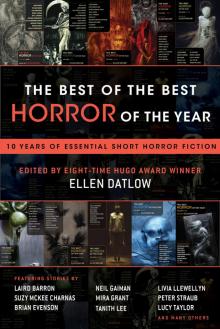 The Best of the Best Horror of the Year
The Best of the Best Horror of the Year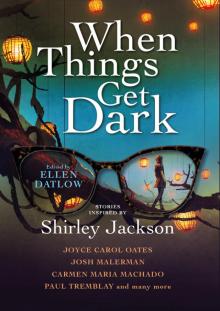 When Things Get Dark
When Things Get Dark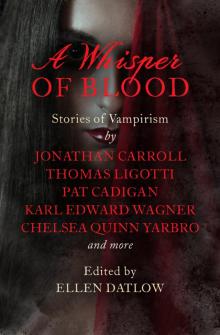 A Whisper of Blood
A Whisper of Blood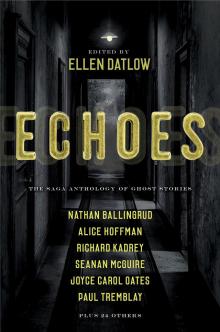 Echoes
Echoes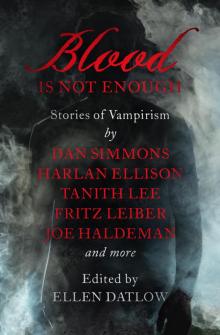 Blood Is Not Enough
Blood Is Not Enough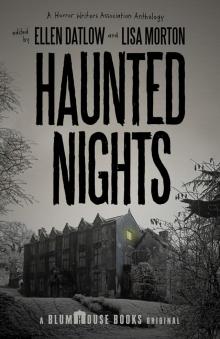 Haunted Nights
Haunted Nights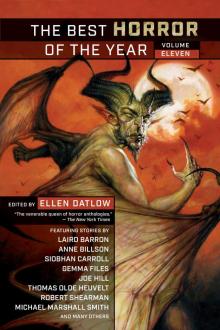 The Best Horror of the Year Volume Eleven
The Best Horror of the Year Volume Eleven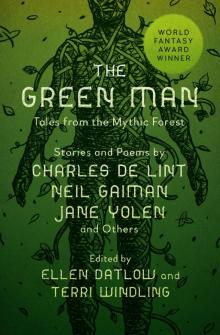 The Green Man
The Green Man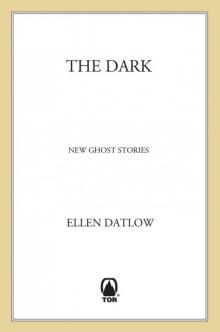 The Dark
The Dark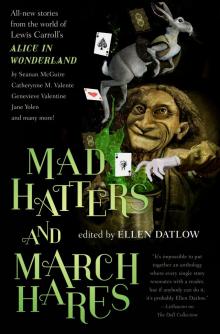 Mad Hatters and March Hares
Mad Hatters and March Hares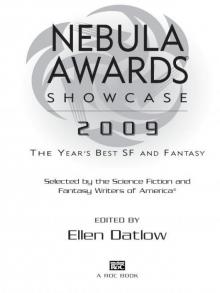 Nebula Awards Showcase 2009
Nebula Awards Showcase 2009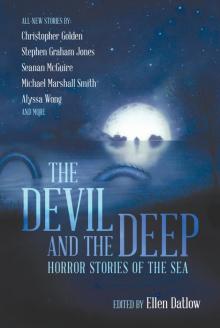 The Devil and the Deep
The Devil and the Deep